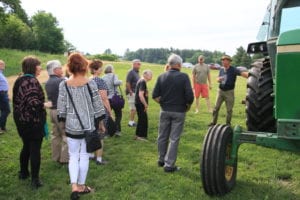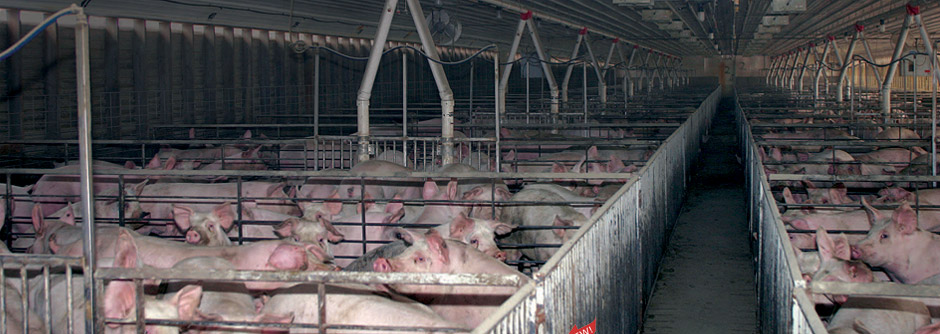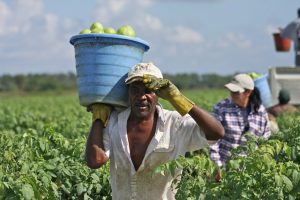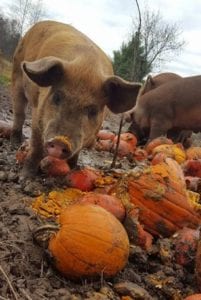Putting Justice on the Table
by Peter Henry, Co-founder, and Board Member, Farm Table Foundation
Recently, I am seeing the term “food justice” in the media. A lot. I have no idea: what does it mean?

After some googling, turns out, food justice refers to the fact that everyone needs fresh, wholesome food in order to be healthy, happy, and live a long life, but, not everyone has access to it. And, how does a country ensure that, like water, air, education and other basics, every community gets the type of food they need to be healthy, happy, and whole? And also, that a community’s food is produced in a way that doesn’t contribute to other social maladies, like pollution, exploitation, climate risk, and so on.
Now, before I go too far, let me be clear: I support the right of people to eat whatever they want. Whatever lousy, salty, trans-fat, foreign additive, high fructose corn syrupy thing—if it’s been approved by the FDA, fits in a plastic bag, is found in a store, or comes on a Sysco truck, then it is all about free choice.
This is America. Die however you want. Eat whatever.
But, food justice…
What if you have no choice but to eat that terrible stuff in plastic bags? What if that is all you can get? What if the only place selling food in your town is a gas station?
That would suck. No heritage pulled pork sandwiches? No nutrient-dense carrots? No super-fresh cheese curds? No delicious pumpkin pie? That does seem unjust.
But, there’s more than that.
What if the food you depend on, the flour, the meat, the milk, the cheese, and the vegetables—what if basic commodities were listed on an exchange somewhere, like Chicago, and their bulk prices were up for grabs to the highest bidder? Or the government set prices and changed them at will?
What if the food your family needs has been produced using undocumented labor, workers who are regularly exploited, abused, asked to work in unsafe conditions? Or the only food available to you is laced with significant herbicide residues? Or grown in Mexico and harvested by children working sixty-hour weeks? Or the food you buy is helping to prop up a dictator and you have no choice because you have to feed your family?
What then?
Well, at that point, I hope someone protests and says this is wrong. Because it is.
Food is not a raw commodity, like gold or copper or manganese. People need it to survive. Communities depend on it for smooth functioning. Societies collapse without it. We need food every day and have no choice but to purchase what is available—even if it forces us into a series of moral cul-de-sacs.
Why is it okay for Fortune 500 companies to bid on, buy, and sell food in what are basically speculative markets?
Cargill makes billions shorting wheat while billions suffer through a price increase.
China buys up millions of acres of cropland in Africa, decides to grow commodity crops, and now millions of Africans come up short on basic foodstuffs.
Hundreds of immigrant workers are hired to pick in California fields polluted with chemicals and end up dying of cancer, leaving orphans in their wake.
 here are a lot of terrible things hidden in the journey to provide three meals a day to every man/woman/child on the planet. It’s a huge undertaking. Not every country does it well. Not everyone gets enough. And it isn’t based on the principle of being “just.” Even here in America.
here are a lot of terrible things hidden in the journey to provide three meals a day to every man/woman/child on the planet. It’s a huge undertaking. Not every country does it well. Not everyone gets enough. And it isn’t based on the principle of being “just.” Even here in America.
For me, food justice comes down to a very simple thing: food independence. If a community produces its own food, it’s got just about everything it needs. If it doesn’t, it has just about nothing.
Local food is not only about the freshest, healthiest, most wholesome way to eat your way through life. It is also about building the smartest, most efficient, and most independent food-web so that a community is well-stocked and taken care of no matter what happens—like a pandemic. And it knows its food is wholesome, fresh, and not making the planet a worse place to live.
Food justice is best realized when you can get food where you are. Grow your own. Go to a farmers’ market. Find local produce in a grocery store. Be responsible for building that network of food sanity in your own backyard. Don’t be dependent on distant systems with which you have no direct relationship and no idea if what is happening is safe, fair, or sustainable.
 Buying from the guy down the road, the one with dirty jeans, who talks funny and works all day in his fields and raises bees and chickens and pigs—buying from him is the best kind of food justice. America was nothing but farmers at one point: the original bedrock who represent the very soil from which our nation grew. Find a farmer, eat local, buy American.
Buying from the guy down the road, the one with dirty jeans, who talks funny and works all day in his fields and raises bees and chickens and pigs—buying from him is the best kind of food justice. America was nothing but farmers at one point: the original bedrock who represent the very soil from which our nation grew. Find a farmer, eat local, buy American.
Rather than choosing to go with big corporations who truck to us from California, racking up an assortment of human and ecosystem degradations along the way, I like the idea of taking care of food ourselves. It’s what we do to show the world we are resourceful, determined, and responsible. We grow it here. We make it here. We put a face to what we put on the table. Not hurting people or torturing animals to get it done.
That feels just to me.
Editor’s note: Peter’s piece points to systemic injustices and rightly says, “I hope someone protests and says this is wrong.” Two Minneapolis-based organizations do just that–through organizing and advocating for more just policies. One is the Institute for Agriculture and Trade Policy; the other is Land Stewardship Project. In addition, Farm Table has supported the efforts of many in our community to protest against the possibility of a Burnett County-based 26,000-head hog factory farm. To get involved, check out Know CAFOs.
Peter Henry is one of Farm Table’s co-founders and currently serves on the board. He is also the owner of Dragonfly Gardens and Magic Oaks Ranch. Peter is a “grass farmer,” which means he is building soil health while producing crops; he is looking to add grazing ruminants in the near future. In the meantime, he produces a lot of organic hay and is developing a vacation rental out of an 1860s log cabin so other people can experience the magic of an oak savannah as it descends to the Apple River.
